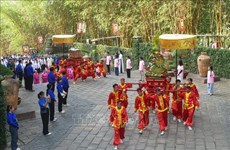Minority collective inspires Bac Kan province
A farm half way up a mountain is used by a group of Tay ethnic people
to grow vegetables and raise fish, cattle and poultry communally.
A farm half way up a mountain is used by a group of Tay ethnic people
to grow vegetables and raise fish, cattle and poultry communally.
The farm is in tiny Ban Nghe Hamlet with 68 households in northern Bac Kan province where most farming is still done on a house-by-house basis. The Tay people in this mountainous poor hamlet traditionally grow rice, maize, soya beans and cassava.
The idea of forming a communal farm was decided on by seven men, who each contributed their cultivated land to work together.
"Initially, people from the seven households planted rice and raised cattle and poultry together because our land is side by side," said Ma Van Nam, leader of the team.
"The cultivated land here is rich, but Tay people usually produce only one crop a year. However, local people had begun to demand fresh vegetables, so we planted some. The rest was a pleasant surprise," Nam said.
The vegetables grew fast and sold well. Market gardens created much higher incomes than planting rice.
Early last year, the seven households decided to mortgage their land to expand their business.
With 80 million VND (roughly 3,700 USD), they set up a farm to grow vegetables, raise fish, cattle and poultry.
Luong Van Hung, the hamlet head and a member of the farm, said the idea of mortgaging land doing cultivation together was really new for his people.
"Doing a collective economic model was very strange. Many people thought that we were insane when we decided to take the risk of growing vegetables," Hung added.
The group members quickly found out that to operate the farm professionally, they had to learn growing techniques as well as accounting and marketing.
Thanks to applying these techniques to production, the 21ha-farm supplies vegetables, fish and meat for the whole district and neighbouring areas.
Their farm provides a stable income of about 80 million VND (3,700 USD) a year for each household.
"At present, many other households would like to join us, but they hesitate", said Hung.
Along with growing vegetable, breeding fishes, cattle and poultry, the farmers also have 16ha of commercial timber trees. The area of forest also has high promise.
At present, the farm creates jobs for 14 regular workers with monthly income of 2 million VND (100 USD).
Establishment of the farm not only creates stable jobs and income, it supplies safe vegetable and foods and also helps local people change their ways of thinking.
One of the difficulties for the farm group is transport, which can be costly, so there is talk of building a road from the hamlet to the farm.
The economic model helps spread advanced technology and plant and animal diversification throughout the region, contributing to hunger and poverty reduction.
The local authority has taken notice and said it intends to expand the model throughout the province.-VNA
The farm is in tiny Ban Nghe Hamlet with 68 households in northern Bac Kan province where most farming is still done on a house-by-house basis. The Tay people in this mountainous poor hamlet traditionally grow rice, maize, soya beans and cassava.
The idea of forming a communal farm was decided on by seven men, who each contributed their cultivated land to work together.
"Initially, people from the seven households planted rice and raised cattle and poultry together because our land is side by side," said Ma Van Nam, leader of the team.
"The cultivated land here is rich, but Tay people usually produce only one crop a year. However, local people had begun to demand fresh vegetables, so we planted some. The rest was a pleasant surprise," Nam said.
The vegetables grew fast and sold well. Market gardens created much higher incomes than planting rice.
Early last year, the seven households decided to mortgage their land to expand their business.
With 80 million VND (roughly 3,700 USD), they set up a farm to grow vegetables, raise fish, cattle and poultry.
Luong Van Hung, the hamlet head and a member of the farm, said the idea of mortgaging land doing cultivation together was really new for his people.
"Doing a collective economic model was very strange. Many people thought that we were insane when we decided to take the risk of growing vegetables," Hung added.
The group members quickly found out that to operate the farm professionally, they had to learn growing techniques as well as accounting and marketing.
Thanks to applying these techniques to production, the 21ha-farm supplies vegetables, fish and meat for the whole district and neighbouring areas.
Their farm provides a stable income of about 80 million VND (3,700 USD) a year for each household.
"At present, many other households would like to join us, but they hesitate", said Hung.
Along with growing vegetable, breeding fishes, cattle and poultry, the farmers also have 16ha of commercial timber trees. The area of forest also has high promise.
At present, the farm creates jobs for 14 regular workers with monthly income of 2 million VND (100 USD).
Establishment of the farm not only creates stable jobs and income, it supplies safe vegetable and foods and also helps local people change their ways of thinking.
One of the difficulties for the farm group is transport, which can be costly, so there is talk of building a road from the hamlet to the farm.
The economic model helps spread advanced technology and plant and animal diversification throughout the region, contributing to hunger and poverty reduction.
The local authority has taken notice and said it intends to expand the model throughout the province.-VNA













